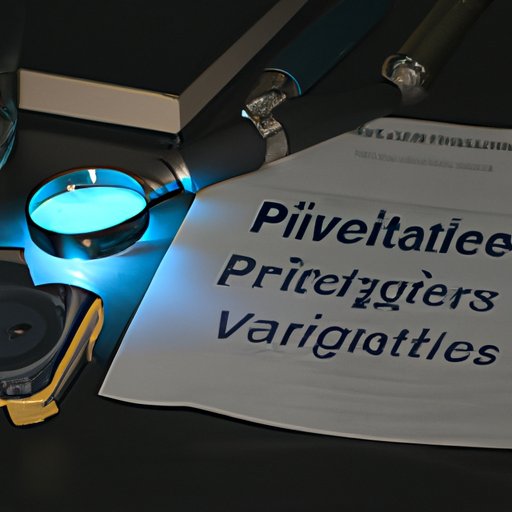Introduction
A private investigator (PI) is an individual who is hired to conduct investigations or provide security services. Private investigators may be hired by individuals, companies, or law enforcement agencies to obtain information about a certain person, business, or event. To become a successful private investigator, you must have certain qualifications and skills, as well as knowledge of the tools and technologies used in the industry.
Definition of a Private Investigator
According to the International Association of Security and Investigative Regulators (IASIR), a private investigator is “an individual who is hired to conduct investigations or provide security services on behalf of a client.” A PI is typically hired by individuals, companies, or law enforcement agencies to uncover evidence or obtain information about a certain person, business, or event. PIs may also be hired to provide security services or to conduct background checks.

Overview of Qualifications and Skills Needed to Become a Private Investigator
To become a successful private investigator, you must possess certain qualifications and skills. These include excellent communication skills, problem-solving abilities, analytical thinking, objectivity, discretion, and attention to detail. You should also have a working knowledge of criminal and civil laws, investigative techniques, and the tools and technologies used in the industry.
Types of Investigations That Private Investigators Are Involved In
Private investigators are typically involved in a variety of investigations, including criminal investigations, corporate investigations, insurance fraud investigations, and surveillance.
Criminal Investigations
Criminal investigations involve the investigation of criminal activities such as murder, rape, burglary, and drug trafficking. Private investigators are often hired by individuals, businesses, and law enforcement agencies to collect evidence, interview witnesses, and perform background checks.
Corporate Investigations
Corporate investigations involve the investigation of corporate activities such as financial fraud, embezzlement, and insider trading. Private investigators are often hired by corporations to uncover evidence of illegal activities and to assess the risk of potential investments.
Insurance Fraud Investigations
Insurance fraud investigations involve the investigation of fraudulent insurance claims. Private investigators are often hired by insurance companies to investigate suspicious claims, verify medical records, and interview witnesses.
Surveillance
Surveillance involves the monitoring of a person or place in order to obtain information or evidence. Private investigators are often hired to conduct surveillance operations in order to gather evidence for criminal and civil cases.

Licensing Requirements for Private Investigators
In most states, private investigators must be licensed in order to legally practice. Licensing requirements vary from state to state, but typically require applicants to pass a criminal background check, complete a specified number of training hours, and pass a written examination. Private investigators may also be required to complete continuing education courses in order to maintain their license.
Tools and Technologies Used by Private Investigators
Private investigators use a variety of tools and technologies to carry out their investigations. These include surveillance equipment, computer forensics, and investigative databases. Surveillance equipment consists of cameras, recording devices, and listening devices that are used to monitor a person or place. Computer forensics involves the analysis of digital data such as emails, text messages, and social media posts. Investigative databases are used to search for public records, criminal histories, and other relevant information.

Tips on How to Market Yourself as a Private Investigator
Marketing yourself as a private investigator is an important part of building your business. Here are some tips on how to effectively market yourself:
Networking
Networking is one of the best ways to build relationships with potential clients. Attend conferences and join professional organizations related to the field of private investigation. Participate in online forums and connect with other PIs to exchange ideas and experiences.
Professional Websites
Having a professional website is a great way to showcase your services and attract new clients. Include information about your qualifications, experience, and services offered. Consider using SEO tactics to increase your visibility in search engine results.
Advertising
Advertising can help increase awareness of your services and draw more clients. Consider advertising in local newspapers, radio stations, and online publications. You can also create flyers and business cards to distribute in your area.
Conclusion
Becoming a private investigator requires certain qualifications, licensing, and tools. Private investigators are typically involved in a variety of investigations, including criminal investigations, corporate investigations, insurance fraud investigations, and surveillance. To market yourself as a PI, networking, creating a professional website, and advertising are all effective strategies. By following these steps, you can become a successful private investigator.
(Note: Is this article not meeting your expectations? Do you have knowledge or insights to share? Unlock new opportunities and expand your reach by joining our authors team. Click Registration to join us and share your expertise with our readers.)
